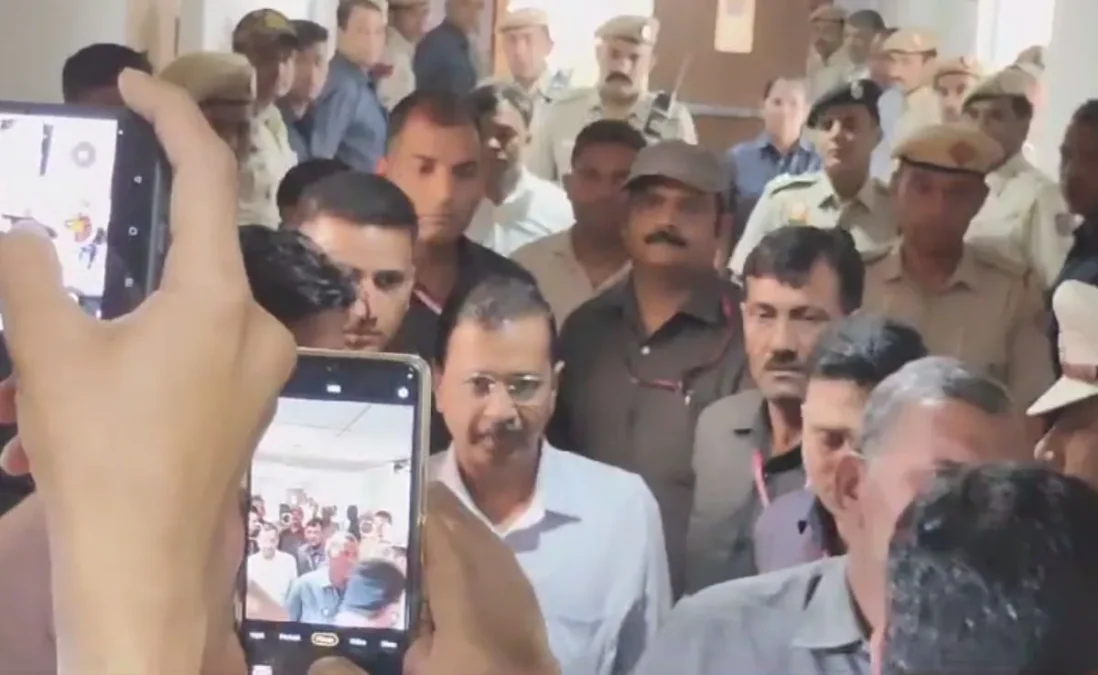CM Arvind Kejriwal, who was arrested in connection with a money-laundering case linked to the now-scrapped Delhi excise policy, faced a crucial court appearance today. As his Enforcement Directorate (ED) custody came to an end, the legal proceedings took center stage.
The Arrest and Allegations on CM Arvind Kejriwal
On March 21, Arvind Kejriwal was taken into custody by the ED, which accused him of non-cooperation during the investigation. The ED’s counsel, SV Raju, highlighted Kejriwal’s alleged failure to provide necessary passwords for his digital devices. This lack of cooperation prompted the ED to seek an extension of his custody.
Court Proceedings
At 11:00 AM today, Arvind Kejriwal was produced before Delhi’s Rouse Avenue Court. The ED sought a 15-day judicial custody for the Delhi CM, emphasizing his uncooperative behavior. During the proceedings, it was revealed that Kejriwal did not disclose the passwords required for accessing his electronic devices. His lawyer also requested special provisions for his health due to an existing illness.
Permission to CM Arvind Kejriwal’s Meet Family
The court granted Arvind Kejriwal permission to meet his wife, Sunita Kejriwal, and ministers Atishi and Saurabh Bhardwaj before being transferred to Tihar Jail. Amid heightened security, Kejriwal will be escorted from the court to the jail.
Legal Challenges faced by CM Arvind Kejriwal
Kejriwal’s arrest has sparked legal battles. A petition filed by the Aam Aadmi Party national convenor in the Delhi High Court alleges that the investigating agency violated his fundamental rights. The court has served notice to the ED, requesting a response by April 2. The hearing is set to continue on April 3.

Political Context
The timing of Kejriwal’s custody coincides with the ongoing Lok Sabha elections. Leaders from the INDIA bloc recently united at the ‘Loktantra Bachao’ (Save Democracy) rally, condemning Kejriwal’s arrest and calling for alliance partners to unite in national interest.
As the legal battle unfolds, Delhi watches closely. Arvind Kejriwal’s fate hangs in the balance, and the allegations of non-cooperation add further complexity to an already charged political environment.
The Legal Battle Intensifies
ED’s Request for Extension
The Enforcement Directorate (ED) has been unyielding in its pursuit of answers. During Kejriwal’s custody, investigators probed financial transactions, scrutinized digital records, and questioned associates. The ED contends that Kejriwal’s non-cooperation hindered the investigation. The agency sought an extension of his custody to delve deeper into the alleged money-laundering network.

CM Arvind Kejriwal Defense
Arvind Kejriwal’s legal team countered the ED’s claims. They argued that the Delhi CM had cooperated to the best of his ability. His lawyers emphasized that Kejriwal’s health condition, which requires regular medical attention, impacted his ability to provide immediate access to passwords. They also highlighted that the investigation pertained to a policy that no longer existed, questioning the urgency of the proceedings.
Public Reaction
The case has divided public opinion. Supporters of Kejriwal view his arrest as politically motivated, while critics demand transparency and accountability. Social media platforms buzzed with hashtags like #KejriwalArrested and #JusticeForKejriwal. Protests erupted outside the court premises, with both AAP supporters and opposition members expressing their views.

Political Implications
Lok Sabha Elections
The timing of Kejriwal’s custody is crucial. As the nation gears up for the Lok Sabha elections, the arrest has become a rallying point for opposition parties. The INDIA bloc, led by Priyanka Gandhi Vadra, has accused the ruling NDA of using state agencies to target political opponents. The ‘Loktantra Bachao’ rally echoed this sentiment, urging unity among opposition parties to safeguard democratic values.
Legal Precedent
The case sets a precedent for politicians and public figures. It underscores the delicate balance between legal proceedings and political maneuvering. Kejriwal’s fate hinges on the court’s decision, but the implications extend beyond his individual case. The outcome will shape how future investigations involving prominent leaders unfold.
The Road Ahead
As Arvind Kejriwal prepares to leave the ED’s custody, the legal battle continues. The court’s verdict will determine whether he faces further detention or walks free. For now, the spotlight remains on the courtroom drama, where law, politics, and public interest intersect.
Conclusion
The case against Arvind Kejriwal underscores the delicate balance between legal proceedings and political dynamics. As the investigation continues, the nation awaits further developments in this high-profile matter. The courtroom drama surrounding the Delhi CM serves as a reminder that no one is above the law, regardless of their political stature.
Disclaimer: This article is based on available information as of April 1, 2024. The situation may evolve, and readers are encouraged to follow updates from reliable news sources.